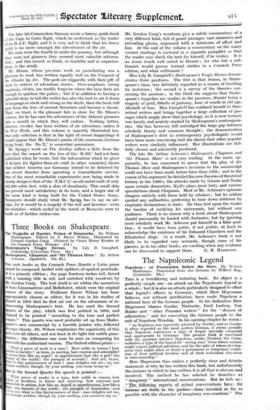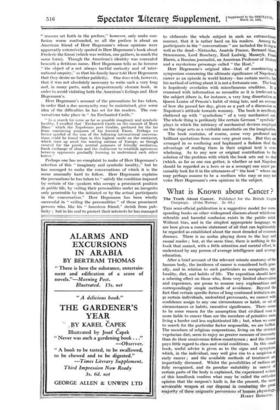The Napoleoruc Legend
Napoleon : or Prostration Before the Hero. By Werner Hedemann. Translated from the German by Wilfred Ray. (Constable. 18s.) This is a bewildering and irritating book. Its object is a
perfectly simple one—an attack on the Napoleonic legend as a whole ; but it is also an attack particularly designed to offset that legend's effects in Germany, which Herr Hegenuann believes, not without justification, have made Napoleon a national hero of the German people. In his dedication Herr Hegemann blames Goethe, Nietzsche, Emil Ludwig, Von Ranke and "other Prussian writers" for the "disease of admiration," and for converting the German people to the cult of Napoleon Worship. In his opening chapter he states :
"As Napoleon was especially admired by Goethe, and as Goethe is often regarded as the most perfect German, it seems possible that Napoleon represents a typo of despot specially congenial and appropriate to Germans. The present book is concerned with the question whether Napoleon, unlike Frederic the Great, embodies a type of the-hoped-for strong man' from whom nations might expect political salvation, and for the sake of whose develop- ment they might allow or desire a permanent or temporary restric- tion of their political freedoin- and of, their individual education in statesmanship."
Herr Hegemartn thus makes. a perfectly clear and definite statement of why he has written this book, but unfortunately the manner in which he has written it is all that is obscure and involved. The method he has selected he describes as " imaginary " international conversations. But he tells us : ` The following reports of actual conversations have—for reasons -set–forth-- in the prefaee--beeal Uivested as far as possible with the character of imaginary conversations." The "reasons set forth in the preface," however, only make con- fusion worse confounded, as all the preface is about an American friend of Herr Hegemann's whose opinions were apparently extensively quoted in Herr Hegemann's book about Frederic the Great (which was written, one gathers, in much the same form). Though the American's identity was concealed beneath a fictitious name, Herr Hegemann tells us he became "the object of a not always tactful curiosity and of inter- national enquiry," so that his family have told Herr Hegemann that they desire no further publicity. One does wish, however, that it was not absolutely necessary to write such a very long and, in many parts, such a preposterously obscure book, in order to avoid violating both the American's feelings and Herr Hegetnann's.
Herr Hegemann's account of the precautions he has taken, in order that a due anonymity may be maintained, give some idea of the difficulties he has set for his readers. The con- versations take place in "An Enchanted Castle."
"In a search for some as far as possible imaginary and symbolic locality, I recalled that 'Enchanted Castle on the summit of Mont Blanc' which the Napoleonic poet Grabbe, profaned for the far from convincing purposes of his lovesick Faust. Perhaps no better symbol of the aim of the following international conversa- tions could be found than in this highest castle on the continent, which rises up amid the warring nations of Europe, as though created for the purely neutral purposes of friendly mediation, frank exchange of ideas and the endeavour to establish agreement between opponents gradually learning to understand each other better."
Perhaps one has no complaint to make of Herr Hegemann's selection of this "imaginary and symbolic locality," but he has managed to make the conversations of which it is the scene unusually hard to follow. Herr Hegemann explains the precautions he has taken to satisfy the condition imposed by certain of the Epeakers who occupy a prominent position in public life, by veiling their personalities under an incognito only penetrable by the initiated or by the actual participants in the conversation." Herr Hegemann has been wholly successful in "veiling the personalities" of those prominent ' persons who, like his "American friend," shrink from pub- licit-; but in his zeal to protect their interests he has managed to obfuscate the whole subject in such an extraordinary manner, that it is rather hard on his readers. Among the participants in the " conversations " are included the living 04 well as the dead—Nietzsche, Anatole France, Bernard Shaw, Stresemann, Lord Rosebery, Emil Ludwig, Masaryk, Fronk Harris, a Russian journalist, an American Professor of History and a mysterious personage called "the Host."
Herr Hegemann's original idea—that of constructing a symposium concerning the ultimate significance of Napoleon's career as an episode in world history—has certain merits, but his method of setting about it is not a fortunate one. The book is hopelessly overladen with miscellaneous erudition. It is crammed with information as recondite as it is irrelevant to
• the subject (there is, for instance, a very long dissertation on Queen Louise of Prussia's habit of rising late, and an account of how she passed her day, given as a part of a discussion on • Napoleon's attitude towards women). The book is needlessly cluttered up with " symbolism " of a very mechanical sort The whole thing is perilously like certain German "symbolic' plays in which the intricacy of mechanical devices employed on the stage acts as a veritable anwsthetic on the imagination.
The book contains, of course, some very profound and brilliant quotations from some very great men. But they are arranged in so confusing and haphazard a fashion that the advantage of reading them in their original text is over- whelming. As to any new or original contribution to the solution of the problem with which the book sets out to deal '(which, as far as one can gather, is whether or not Napoleon should be regarded as a hero or as a scourge) one must pre- sumably look for it in the utterances of" the host" whom one may perhaps assume to be a medium who may or may not voice Herr Hegemann's own opinions in the subject.















































 Previous page
Previous page